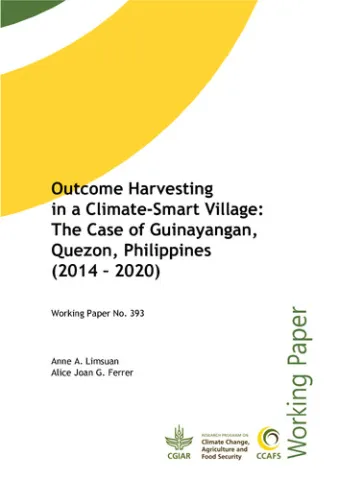Outcome Harvesting in a Climate-Smart Village: The Case of Guinayangan, Quezon, Philippines (2014-2020)

Abstract
The pioneering work of establishing a Climate-Smart Village (CSV) in Guinayangan, Quezon Province in 2014 became an avenue for promoting interventions to address climate change in a local government in the Philippines. The CSV served as a laboratory where climate-smart technologies and practices were tested, promoted, and scaled out. Through a CSV, Climate-Smart Agriculture was introduced as an integrated approach that aims to achieve short- and long-term agriculture development priorities in the face of climate change.
With the project coming to an end, the immediate, intermediate, and ultimate outcomes were identified among different sectors through the process of outcome harvesting. Evidence of change were collected and analyzed to identify the outcomes through engagement with farmers, key persons, and other local leaders. Identified outcomes included changes in awareness, knowledge, practices, approaches, and strategies, particularly with individual farmers, community organizations, municipality, and even at the national level.
Significantly, the CSV became a learning platform to farmers – experiences and knowledge were gained and spread not only within their learning groups, but also to other farmers, community organizations, and local executives in the municipality. The achievements and contributions of CSV in Guinayangan has reached a higher scale – it influenced the national implementation of the Adaptation and Mitigation Initiative for Agriculture (AMIA) Program, a flagship program by the Department of Agriculture (DA). AMIA villages were established across all regions of the Philippines, many of which were inspired by the opportunities to visit the CSV in Guinayangan on at least two occasions. The CSVs established by the International Institute of Rural Reconstruction (IIRR) served as an advanced CSV in the initial years of the DA AMIA National Program. IIRR supported the DA and FAO efforts to develop policy briefs based on experiences from the DA AMIA Program.
